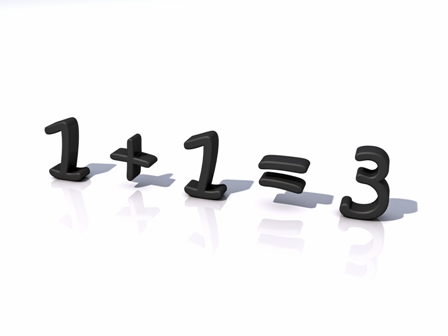 Lately, we’ve been thinking a lot about how math is taught. So, a recent article in the Atlantic on Calculus for 5-year-olds was catnip to us. Funny thing is, no sooner did we read this, then suddenly there was talk of early elementary higher math and the underlying book, Moebius Noodle, everywhere. Apparently, we’re in the middle of a Kindergarten Calculus fad.
Lately, we’ve been thinking a lot about how math is taught. So, a recent article in the Atlantic on Calculus for 5-year-olds was catnip to us. Funny thing is, no sooner did we read this, then suddenly there was talk of early elementary higher math and the underlying book, Moebius Noodle, everywhere. Apparently, we’re in the middle of a Kindergarten Calculus fad.
The principles at play are sound and admirable. There’s a great deal that’s toxic in the way math is presented in schools. So often, mathematical concepts are mystified and alienated from the business of life. Students are taught the subject in a regimented, hierarchical way that not only ill-suits the often non-linear way children learn but also ill-suits the nature of the subject. It makes no sense to treat Algebra and Geometry as discrete subjects. The world of mathematics is highly integrated and intricately interdependent. Treating it otherwise denies students all kinds of cognitive aids as things get more complicated.
The early education specialists who are pioneering the Kindergarten Calculus idea recognize not only these challenges but others, too. For instance, as they see it, the things we teach first (arithmetic, rote memorization, moving numbers around) are in fact perfectly inappropriate to younger students’ developing brains. It’s the nominally higher level stuff, the conceptual business of recognizing patterns and studying structure, that young minds can more easily handle and even enjoy.
In other words, the way we’ve been teaching math for generations is inimical to pleasure, confidence, and mastery. Elementary school math is often a torment and alienates more than it educates. So, they propose a sort of inversion. Kids should start with the fun and accessible stuff in the form of play, like using mirrors to explore infinity or experimenting with fractals. The hope is that these will impart the concepts that then make the numbers accessible. Math, after all, is not about numbers, numbers are simply convenient representations that let us interact with the fundamental ideas.
The problem, such as it is, in the 5-year-old Calculus craze is one of branding and of habits of thought. Conceptually-oriented play is excellent and the benefits are manifest. But to call it Calculus brings things to bear on “play” that we should be dedicating ourselves to holding at bay. First, it’s pure vanity. Elevating our children’s play and our children’s learning to the level of Calculus muddles them with our own desires in a way that is unhealthy and unhelpful. More importantly, as with many of these sorts of things, once it catches on, it sets a tone for the activities involved that is troubling. Parents consumed with getting ahead will no doubt misappropriate the intentions and turn the play into a programmatic thing, not a way of actually and honestly engaging with our children in a spontaneous way. Above all, while we should be developing every tool and resource possible to offer our kids, we should not do it in a spirit of serious-mindedness in kindergarten. Play is play and the benefits just of that are beyond measure. Soon enough they’ll be immersed in demands and deadlines.











